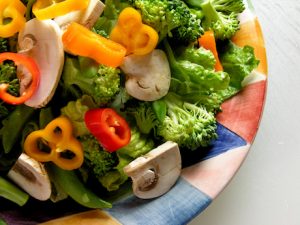It’s January–time to put those New Year’s resolutions to eat well into practice! Here are some tips to help make 2018 your best year ever from Union Institute & University.
1. Let MyPlate Be Your Guide: Confused about what to eat to stay healthy? Visit the website or download the easy to use app and get fit, one plate at a time! https://www.choosemyplate.gov/
2. Read Food Labels: The new food labels will be here before you know it. Soon you’ll be able to keep an eye out for added sugars. Check out other changes at https://www.fda.gov/Food/GuidanceRegulation/GuidanceDocumentsRegulatoryInformation/LabelingNutrition/ucm385663.htm
3. Choose Whole Grains: Make at least half of the grains you eat “whole grains” and look for the whole [name of grain] as the first ingredient on food labels.
4. Don’t Skip Meals: Even if you’re rushed for time, eating at least a quick snack–like plain yogurt with fruit, or whole grain crackers with peanut butter–can keep your energy up and prevent you from overeating the next chance you get!
5. Plan Ahead: Having a plan can help keep you focused on your goal when you’re eating out or on the run. It’s easy to grab something unhealthy from a vending machine, get enticed by those donuts at work, or order less-than-healthy items in a restaurant. Instead, pack healthy snacks and check menus ahead of time for healthier options.
6. Make Those Healthy Snacks Easy To Grab and Go: It’s all about convenience. By preparing snacks like cut-up vegetables, fruit, low-fat cheese and nuts, you can say no to cookies and chips.
7. Watch Portion Sizes at Restaurants: Have you heard about portion distortion? The average restaurant entrée with sides has about 1,300 calories–without a drink, appetizer or dessert! Split dinner with a friend or take half of your meal home to enjoy the next day.
8. Learn How to Cook: Preparing food at home can be fun, healthy and save you money. If you need to brush up on your cooking skills, check out these “how to” videos at http://www.eatright.org/videos
9. Be Mindful of Salt: Salt is essential, but Americans typically consume more than twice the amount recommended each day. Look out for hidden salt in foods, especially prepared items like snack foods, canned soups, and frozen dinners.
10. Go with Good Fats: It’s best to replace animal fats with healthier fats from plants. Healthy fats can be found in nuts, seeds, avocado, fish and olive oil. Beware of two plant-based oils which contain saturated fat: coconut and palm oil.
These Healthy Tips were brought to you by UI&U affiliated faculty members Cynthia Blocksom, M.Ed., R.D., L.D., M.C.H.E.S., F.A.N.D. and Terri Mendoza, S.M, R.D., L.D.N., C.L.C.
A career in the health and wellness profession is exciting and in demand. Union offers two career paths that will put you front and center in the health and wellness profession. Start today by choosing a B.S. in Maternal and Child Health – Human Lactation degree or a Graduate Certificate in Health Education.
B.S. in Maternal and Child Health – Human Lactation https://myunion.edu/academics/bachelors/maternal-child-health/
Graduate Certificate in Health Education. https://myunion.edu/academics/professional-studies/certificate-in-health-education/
###





